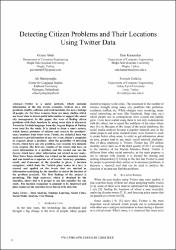Detecting Citizen Problems and Their Locations Using Twitter Data
Özet
Twitter is a social network, which contains information of the city events (concerts, festival, etc.), city problems (traffic, collision, and road incident), the news, feelings of people, etc. For these reasons, there are many studies, which use tweet data to detect useful information to support the smart city management. In this paper, the ways of finding citizen problems with their locations by using tweet data is discussed. Tweets in Turkish language from the Aegean Region of Turkey were used for the study. It is aimed to form a smart system, which detects problems of citizens and extracts the problems' exact locations from tweet texts. Firstly, the collected data was analyzed to get information of any city event, citizen's complaint or requests about a problem. After the possibility of detecting tweets, which have any city problem, was ensured, two datasets were created. The first one consists of the tweets that have an event information or a problem and the second one has the tweets, which have other information not related to our study. Then Naive Bayes classifier was trained on the annotated tweets and was tested on a separate set of tweets. Accuracy, precision, recall, and F-measure of the classifier is given. A location recognizer, which finds the Turkish place names in a text, is created and applied on the tweets that are marked as information-containing by the classifier to detect the location of the problem precisely. The first findings of the project is promising. The high accuracy, which is obtained by the classifier, shows that it is proper to use this classifier for our study. The location recognizer is planned to be improved and place names on the real-time tweet data is to be detected.


















